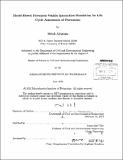| dc.contributor.advisor | Franz-Josef Ulm. | en_US |
| dc.contributor.author | Akbarian, Mehdi | en_US |
| dc.contributor.other | Massachusetts Institute of Technology. Dept. of Civil and Environmental Engineering. | en_US |
| dc.date.accessioned | 2012-10-10T16:47:04Z | |
| dc.date.available | 2012-10-10T16:47:04Z | |
| dc.date.copyright | 2012 | en_US |
| dc.date.issued | 2012 | en_US |
| dc.identifier.uri | http://hdl.handle.net/1721.1/73847 | |
| dc.description | Thesis (S.M.)--Massachusetts Institute of Technology, Dept. of Civil and Environmental Engineering, 2012. | en_US |
| dc.description | Cataloged from PDF version of thesis. | en_US |
| dc.description | Includes bibliographical references (p. 116-121). | en_US |
| dc.description.abstract | Responsible for about a third of the annual energy consumption and greenhouse gas (GHG) emissions, the U.S. transportation Network needs to attain a higher level of sustainability. This is particularly true for the roadway Network and the design of pavements in it. Vehicle fuel consumption required to overcome resisting forces due to pavement-vehicle interaction (PVI) is an essential part of life-cycle assessment (LCA) of pavement systems. These PVIs are intimately related to pavement structure and material properties. While various experimental investigations have revealed potential fuel consumption differences between flexible and rigid pavements, there is high uncertainty and high variability in the evaluated impact of pavement deflection on vehicle fuel consumption. This report adopts the perspective that a mechanistic model can contribute to closing the uncertainty gap of PVI in pavement LCA. With this goal in mind, a first-order mechanistic pavement model is considered, and scaling relationships between input parameters and the impact of PVI on vehicle fuel consumption are developed. An original calibration-validation method is established through wave propagation using the complete set of Falling Weight Deflectometer (FWD) time history data from FHWA's Long Term Pavement Performance program (LTPP), representing the U.S. roadway Network. Distributions of model parameters are determined on pavement material properties (top layer and subgrade moduli), structural properties (thickness), and loading conditions obtained from model calibration and the LTPP datasets. These input distributions are used in Monte-Carlo simulations to determine the impact of flexible and rigid pavements on passenger car and truck fuel consumption within the roadway Network. It is shown that rigid pavements behave better than flexible ones in regard to PVI due to higher stiffness. A final comparison with independent field data provides a reality check of the order of magnitude estimates of fuel consumption due to PVI as determined by the model. The calculated change in fuel consumption is used in a comparative LCA of flexible and rigid pavements, and it is shown that the impact of PVI deflection becomes increasingly important for high volume flexible roadways and can surpass GHG emissions due to construction and maintenance of the roadway system in its lifetime. | en_US |
| dc.description.statementofresponsibility | by Mehdi Akbarian. | en_US |
| dc.format.extent | 121 p. | en_US |
| dc.language.iso | eng | en_US |
| dc.publisher | Massachusetts Institute of Technology | en_US |
| dc.rights | M.I.T. theses are protected by
copyright. They may be viewed from this source for any purpose, but
reproduction or distribution in any format is prohibited without written
permission. See provided URL for inquiries about permission. | en_US |
| dc.rights.uri | http://dspace.mit.edu/handle/1721.1/7582 | en_US |
| dc.subject | Civil and Environmental Engineering. | en_US |
| dc.title | Model based pavement-vehicle interaction simulation for life cycle assessment of pavements | en_US |
| dc.title.alternative | Model based PVI interaction simulation for LCA of pavements | en_US |
| dc.type | Thesis | en_US |
| dc.description.degree | S.M. | en_US |
| dc.contributor.department | Massachusetts Institute of Technology. Department of Civil and Environmental Engineering | |
| dc.identifier.oclc | 810458211 | en_US |
